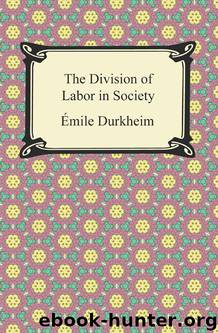The Division of Labor in Society by Durkheim Emile

Author:Durkheim, Emile [Durkheim, Emile]
Language: eng
Format: epub, azw3
Publisher: Digireads.com
Published: 2013-01-01T00:00:00+00:00
IV
The following propositions sum up the first part of our work. Social life comes from a double source, the likeness of consciences and the division of social labor. The individual is socialized in the first case, because, not having any real individuality, he becomes, with those whom he resembles, part of the same collective type; in the second case, because, while having a physiognomy and a personal activity which distinguishes him from others, he depends upon them in the same measure that he is distinguished from them, and consequently upon the society which results from their union.
The similitude of consciences gives rise to juridical rules which, with the threat of repressive measures, impose uniform beliefs and practices upon all. The more pronounced this is, the more completely is social life confounded with religious life, and the nearer to communism are economic institutions.
The division of labor gives rise to juridical rules which determine the nature and the relations of divided functions, but whose violation calls forth only restitutive measures without any expiatory character.
Each of these bodies of juridical rules is, moreover, accompanied by a body of purely moral rules. Where penal law is very voluminous, common morality is very extensive; that is to say, there is a multitude of collective practices placed under the protection of public opinion. Where restitutive law is highly developed, there is an occupational morality for each profession. In the interior of the same group of workers, there exists an opinion, diffuse in the entire extent of this circumscribed aggregate, which, without being furnished with legal sanctions, is rendered obedience. There are usages and customs common to the same order of functionaries which no one of them can break without incurring the censure of the corporation.{300} This morality is distinguished from the preceding by differences analogous to those which separate the two corresponding types of law. It is localized in a limited region of society. Moreover, the repressive character of the sanctions attaching to it is much less accentuated. Professional misdeeds call forth reprobation much more feeble than attacks against public morality.
The rules of occupational morality and justice, however, are as imperative as the others. They force the individual to act in view of ends which are not strictly his own, to make concessions, to consent to compromises, to take into account interests higher than his own. Consequently, even where society relies most completely upon the division of labor, it does not become a jumble of juxtaposed atoms, between which it can establish only external, transient contacts. Rather the members are united by ties which extend deeper and far beyond the short moments during which the exchange is made. Each of the functions that they exercise is, in a fixed way, dependent upon others, and with them forms a solidary system. Accordingly, from the nature of the chosen task permanent duties arise. Because we fill some certain domestic or social function, we are involved in a complex of obligations from which we have no right to free ourselves.
Download
The Division of Labor in Society by Durkheim Emile.azw3
This site does not store any files on its server. We only index and link to content provided by other sites. Please contact the content providers to delete copyright contents if any and email us, we'll remove relevant links or contents immediately.
Born to Run: by Christopher McDougall(7125)
The Leavers by Lisa Ko(6948)
iGen by Jean M. Twenge(5415)
Sapiens by Yuval Noah Harari(5370)
Spare by Prince Harry The Duke of Sussex(5195)
The Kite Runner by Khaled Hosseini(5178)
Machine Learning at Scale with H2O by Gregory Keys | David Whiting(4313)
Bullshit Jobs by David Graeber(4190)
Never by Ken Follett(3954)
Goodbye Paradise(3810)
Livewired by David Eagleman(3772)
Fairy Tale by Stephen King(3394)
A Dictionary of Sociology by Unknown(3085)
Harry Potter 4 - Harry Potter and The Goblet of Fire by J.K.Rowling(3073)
The Social Psychology of Inequality by Unknown(3029)
The Club by A.L. Brooks(2925)
Will by Will Smith(2919)
0041152001443424520 .pdf by Unknown(2845)
People of the Earth: An Introduction to World Prehistory by Dr. Brian Fagan & Nadia Durrani(2736)
